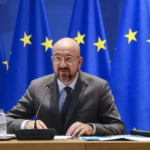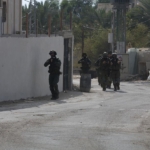“I am a pessimist when it comes to the idea of the two-state solution; I think that Palestinians are aware that what they have to stress most today is their legal rights – beyond any immediate take on the two-state solution”, said Michel Foucher a prominent French political analyst, former diplomat and assistant minister of foreign affairs. The expert in geopolitics visited Egypt last week to give two lectures on the state of borders in the region almost a century after the Sykes-Picot agreement — signed secretly in 1916 to determine the modern borders of Middle Eastern states, according to the interests of the region’s main former colonial powers: England and France. For the most part these borders remain, Foucher told, despite so many challenges to their integrity and very logic.For Foucher — a geographer by training, who focuses on the politics of national boundaries in Europe and the world — it is the undefined borders in the region that pose the biggest problems. “This is not just about the borders between Israel and a would-be Palestinian state but also between Israel and Lebanon for example”, he said. Foucher said there are multiple challenges to border stability, which the region’s states will have to address to bring lasting calm to the region. These include the fate and hopes of the Kurds, the influence and threat of the Islamic State (IS) group and the Sunni-Shia balance of power. The borders of both Iraq and Syria might be considered to be a bit more flexible in allowing for an interaction between the Kurdish zones, but they would hold as the sovereign borders of sovereign states. IS, Foucher said, is another “unlikely influence” on the borders of the Arab Mashreq. Despite its presence, and that of Al-Qaeda and Ansar Al-Islam, among other Jihadi groups, IS is not making larger territorial conquests. Rather, the group is “actually losing territorial control and could well be defeated in a year or two”. The future, for Foucher, is more dependent on the established and almost integrated groups that are actually acting across the borders of sovereign states. One “clear example” for him is Hezbollah, which plays a key role in the conflict between the Syrian ruling regime of Bashar Al-Assad and his opponents, supported by Ansar Al-Islam. “There has to be a deal between Iran and Saudi Arabia; this deal needs international support, but it also needs a regional broker”, he said. Despite many internal concerns, which have consumed much of its political energy over the past five years, Egypt remains to be best placed to play this role.
Geopolitics expert Michel Foucher on border challenges, Middle East stability
- A Napoli apre l’ascensore del Monte Echia e sarà gratis per i residenti
- Il Centro Antiviolenza del Gemelli compie un anno: 61 le donne prese in carico
- Parlamento Europeo: prepararsi ad allargamento anche con riforma Trattati
- Palermo: Convegno all’Assemblea Regionale Siciliana sul regionalismo differenziato







